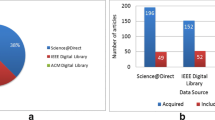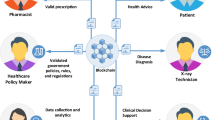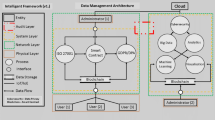Abstract
The last few years have witnessed exponential rise in online digital data for real-time communication, storage, and query-driven processing. It has broadened the horizon for decentralized and ad-hoc digital data used for swift decision making. Nowadays, Electronic healthcare (e-Healthcare) is one of the most demanding industries for telemedicine and Electronic Healthcare Record (EHR) communication purposes. However, ensuring data-security over uncertain channels has remained challenge. To alleviate data-security challenges and enable preserved and immutable data exchange, blockchain technology has been found potential. Despite such significances, most of the existing EHR -oriented blockchain frameworks are developed permissionless with hospital as central unit with almost all access rights. This as a result has demotivated patients due to private data breaches and fake-insurance claims. Considering this limitation developing a patient-centric secure blockchain framework was inevitable. Recently, securing EHR data is a hot research topic and the existing works used varied schemes to enhance the security and privacy of EHR with minimum cost. But the existing studies faces several critical issues like computational complexity, higher processing time, data leakage, sensitive to different attacks, scalability problem etc. The aforementioned issues in the existing studies leads the system as reduced confidentiality and data insecurity. Thus, to overcome such issues, this paper proposes a highly robust pre-transaction signature verification assisted patient-centric multi-stakeholder blockchain model. The proposed blockchain framework focused on multi-stakeholder scalability as well as interoperability aspects while guaranteeing attack-resilience. It was designed over Ethereum armored with blockchain manager (BCM) and smart contract components, where cloud-based interplanetary file system was developed to support decentralized data-storage. It employed a gateway component to perform user’s signature verification to thwart away intruders. Once verifying the signature, BCM triggers user’s request to the smart contract that verifies user details and allied role, right and access (RRA) policies. In sync with RRA policies for the requesting node, BCM allows user (patients and doctors) to perform data upload, view and sharing. To share the patient data, the proposed method triggers a signature request phase in which the doctor requests intended patient for signature and receiving the signature-acknowledgement it performs unabstracted data view and sharing and alleviates any probability of single-point-failure. The proposed blockchain framework provides a unified solution with improved flexibility, availability, decentralized access, identity management, user authentication, patient centric permissioned control and data security that makes it suitable for real-time purposes.





Similar content being viewed by others
Availability of data and materials
Not applicable.
References
Al Hamid HA, Rahman SMM, Hossain MS, Almogren A, Alamri A (2017) A security model for preserving the privacy of medical big data in a healthcare cloud using a fog computing facility with pairing-based cryptography. IEEE Access 5:22313–22328
Al-Issa Y, Ottom MA, Tamrawi A (2019) eHealth cloud security challenges: a survey. Hindavi, J Healthc Eng 2019:1–15
Alzahrani AGM, Alenezi A, Mershed A, Atlam H, Mousa F, Wills G (2020) A framework for data sharing between healthcare providers using blockchain Tech. Rep
Argaw ST, Bempong NE, Eshaya-Chauvin B, Flahault A (2019) The state of research on cyberattacks against hospitals and available best practice recommendations: a scoping review BMC Med. Inform Decis Mak 19(1):10
Bahga A, Madisetti VK, Jamoom E, Yang N, Hing E (2013) Adoption of certified electronic health record systems and electronic information sharing in A cloud-based approach for interoperable electronic health records (EHRs). IEEE Biomed J Health Inform 17(5):894–906
Chelladurai U, Pandian S (2022) A novel blockchain based electronic health record automation system for healthcare. J Ambient Intell Humaniz Comput 13(1):693–703
Chen TS, Liu CH, Chen TL, Chen CS, Bau JG, Lin TC (2012) Secure dynamic access control scheme of PHR in cloud computing. J Med Syst 36(6):4005–4020
Chenthara S, Ahmed K, Wang H, Whittaker F (2019) Security and privacy-preserving challenges of e-health solutions in cloud computing. IEEE Access 7:74361–74382
Coventry L, Branley D (2018) Cybersecurity in healthcare: a narrative review of trends, threats and ways forward. Maturitas 113:48–52
Dean DJ et al (2017) Engineering scalable, secure, multi-tenant cloud for healthcare data. In: IEEE World Congress on Services (SERVICES), Honolulu, HI, pp 21–29
Hahn C, Kwon H, Hur J (2019) Trustworthy delegation toward securing mobile healthcare cyber-physical systems. IEEE Internet of Things J 6(4):6301–6309
Haque R, Sarwar H, Kabir SR, Forhat R, Sadeq MJ, Akhtaruzzaman M, Haque N (2020) Blockchain-based information security of electronic medical records (EMR) in a healthcare communication system. Intelligent computing and innovation on data science. Springer, Singapore, pp 641–650
Hasan HR, Salah K (2018) Proof of delivery of digital assets using blockchain and smart contracts. IEEE Access 6:65439–65448
Hong J, Morris P, Seo J (2017) Interconnected personal health record ecosystem using IoT cloud platform and HL7 FHIR. In: IEEE Intl. Conf. on Healthcare Informatics (ICHI), Park City, UT, pp 362–367
https://economictimes.indiatimes.com/tech/internet/why-cybersecurity-should-be-indias-foremost-priority/articleshow/71843562.cms?from=mdr [Accessed on 15 Nov 2021]
https://www.healthcareitnews.com/projects/biggest-healthcare-data-breaches-2018-so-far [Accessed on 15 Nov 2021]
Huang Q, Yue W, He Y, Yang Y (2018) Secure identity-based data sharing and profile matching for mobile healthcare social networks in cloud computing. IEEE Access 6:36584–36594
Jamoom E, Yang N, Hing E (2016) Adoption of certified electronic health record systems and electronic information sharing in physician offices: United States US Dept. Health Hubb, Services Centers Disease Control Prevention Nat. Center Health Statist Hyattsville, MD, USA, Tech. Rep, p 236
Kish LJ, Topol EJ (2015) Unpatients—why patients should own their medical data. Nat Biotechnol 33(9):921
Koczkodaj WW, Mazurek M, Strzaka D, Wolny-Dominiak A, Woodbury-Smith M (2019) Electronic health record breaches as social indicators. Soc Indic Res 141(2):861–871
Lee S, Song JH, Kim IK (2016) CDA generation and integration for health information exchange based on cloud computing system. IEEE Trans Serv Comp 9(2):241–249
Lubamba C, Bagula A (2017) Cyber-healthcare cloud computing interoperability using the HL7-CDA standard. In: IEEE Symposium on Computers and Communications (ISCC), Heraklion, pp 105–110
Madine MM, Battah AA, Yaqoob I, Salah K, Jayaraman R, Al-Hammadi Y, Pesic S, Ellahham S (2020) Blockchain for giving patients control over their medical records. IEEE Access 8:193102–193115
Malik MI, Mcateer I, Hannay P, Baig Z (2018) Preparing for secure wireless medical environment in 2050: a vision. IEEE Access 6:25666–25674
McLeod A, Dolezel D (2018) Cyber-analytics: modeling factors associated with healthcare data breaches. Decis Support Syst 108:57–68
Mehraeen E, Ghazisaeedi M, Farzi J, Mirshekari S (2017) Security challenges in healthcare cloud computing: a systematic review. Glob J Health Sci 3
Nandhini M, Muthukumar KA (2016) Secured sharing of medical data on hybrid cloud environment. Int J Comput Sci Inform Technol 7(2):729–733
Patel V (2018) A framework for secure and decentralized sharing of medical imaging data via blockchain consensus. Health Inform J 25(4):1398–1411
Ramani V, Kumar T, Bracken A, Liyanage M, Ylianttila M (2018) Secure and efficient data accessibility in blockchain based healthcare systems. In: Proc. GLOBECOM, pp 206-212
Ri N, Rachkidi E, Agoulmine N, Taher NC (2017) Towards using blockchain technology for eHealth data access management. In: Proc. IEEE 4th Int. Conf. Adv. Biomed. Eng, pp 1–4
Spatar D, Kok O, Basoglu N, Daim T (2019) Adoption factors of electronic health record systems. Technol Soc 58:101144
Sun J, Yao X, Wang S, Wu Y (2020) Blockchain-based secure storage and access scheme for electronic medical records in IPFS. IEEE Access 8:59389–401
Tanwar S, Parekh K, Evans R (2020) Blockchain-based electronic healthcare record system for healthcare 4.0 applications. J Inform Secur Appl 50:102407
The future of health care cybersecurity. J Nurs Regul 2018;8(4): S29- S31
Walker-Roberts S, Hammoudeh M, Dehghantanha A (2018) A systematic review of the availability and efficacy of countermeasures to internal threats in healthcare critical infrastructure. IEEE Access 6:25167–25177
Wang W, Huang H, Wu Y, Huang Q (2019) Cryptanalysis and improvement of an anonymous batch verification scheme for mobile healthcare crowd sensing. IEEE Access 7:165842–165851
Woods SS, Schwartz E, Tuepker A, Press NA, Nazi KM, Turvey CL, Nichol WP (2013) Patient experiences with full electronic access to health records and clinical notes through my HealtheVet personal health record pilot: qualitative study. Med J Internet Res 15(3):e65
Wu Y, He F, Yang Y (2020) A grid-based secure product data exchange for cloud-based collaborative design. Int J Coop Inform Syst 29(01n02):2040006
Xia Q, Sifah EB, Smahi A, Amofa S, Zhang X (2017) BBDS: blockchain-based data sharing for electronic medical records in cloud environments. Information 8(2):44
Xu C, Wang N, Zhu L, Sharif K, Zhang C (2019) Achieving searchable and privacy-preserving data sharing for cloud-assisted E-healthcare system. IEEE Internet of Things J 6(5):8345–8356
Zala K, Thakkar HK, Jadeja R, Dholakia NH, Kotecha K, Jain DK, Shukla M (2022) On the design of secured and reliable dynamic access control scheme of patient e-healthcare records in cloud environment. Comput Intell Neurosci. https://doi.org/10.1155/2022/3804553
Acknowledgements
My completion of this Research work could not have been accomplished without the support of my Ph.D. Guide, Dr P.I Basarkod, Reva University and HOD Dr B.N Shobha, SJC Institute of Technology, Chickballapur. Thank you for allowing me time away from you to research and write. Thanks to my parents Dr Uma B Gopal, Late K. Gopalakrishna and Husband Mr. Prabhu Kumar A, Mother-in-law, and child. The countless times you kept the children during our hectic schedules will not be forgotten. Finally, my deepest gratitude to my Friends and colleagues. Your encouragement when the times got rough are much appreciated and noted. It was a great comfort and relief to know that you were willing to provide management of our household activities while I completed my work.
Funding
Not applicable.
Author information
Authors and Affiliations
Corresponding author
Ethics declarations
Conflict of interest
Not applicable.
Additional information
Publisher's Note
Springer Nature remains neutral with regard to jurisdictional claims in published maps and institutional affiliations.
Rights and permissions
Springer Nature or its licensor (e.g. a society or other partner) holds exclusive rights to this article under a publishing agreement with the author(s) or other rightsholder(s); author self-archiving of the accepted manuscript version of this article is solely governed by the terms of such publishing agreement and applicable law.
About this article
Cite this article
Chandini, A.G., Basarkod, P.I. Patient centric pre-transaction signature verification assisted smart contract based blockchain for electronic healthcare records. J Ambient Intell Human Comput 14, 4221–4235 (2023). https://doi.org/10.1007/s12652-023-04526-8
Received:
Accepted:
Published:
Issue Date:
DOI: https://doi.org/10.1007/s12652-023-04526-8




